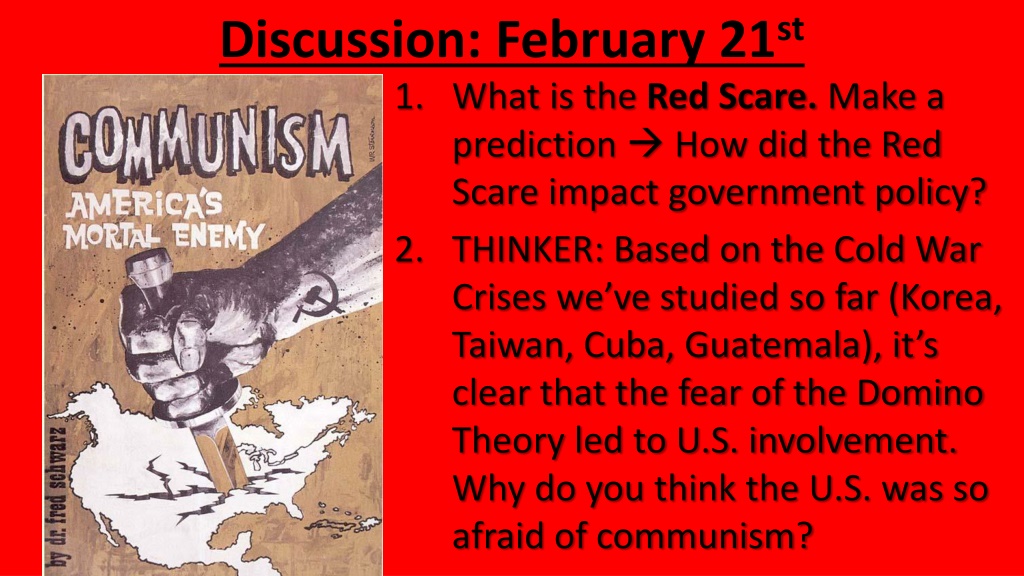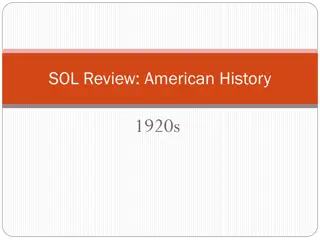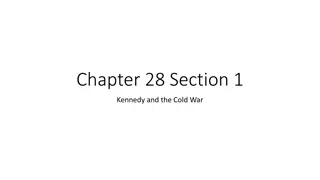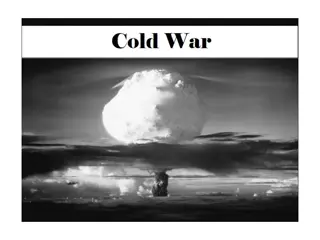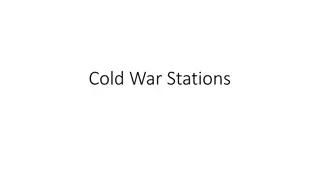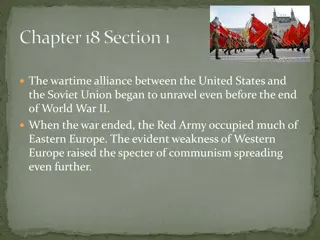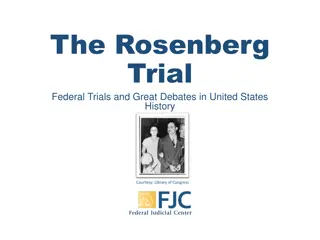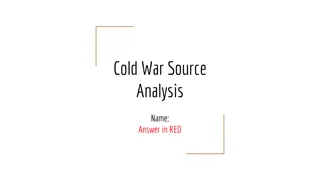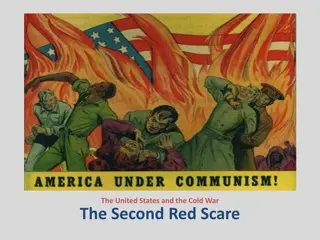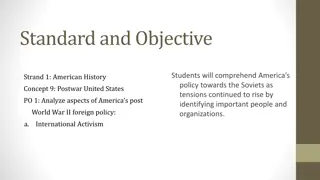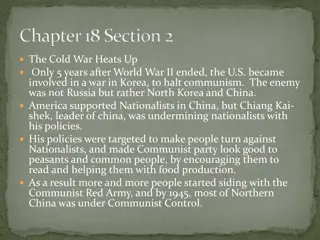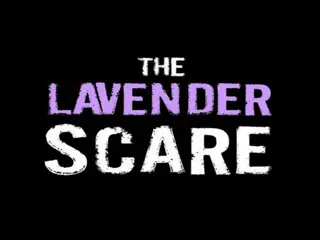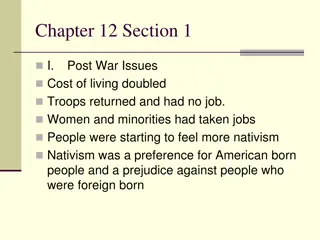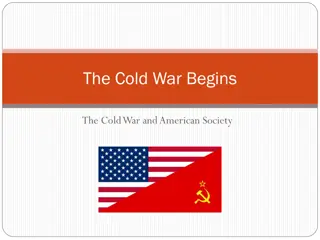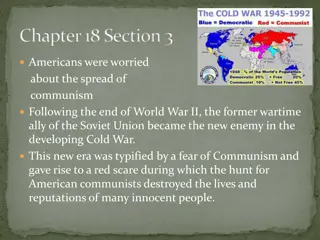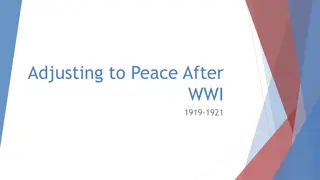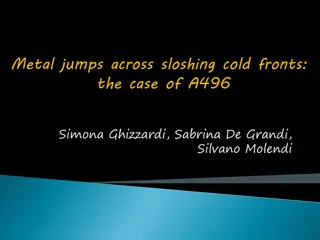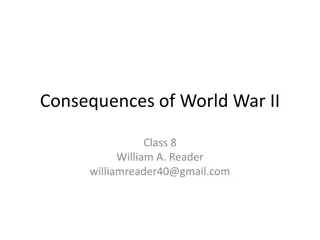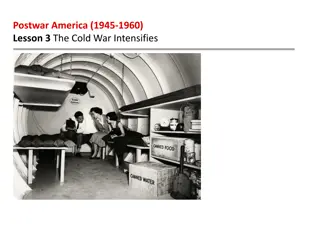The Red Scare and McCarthyism: Cold War Repression in America
The Red Scare and McCarthyism were periods of intense anti-communist hysteria in the United States during the Cold War. The fear of communism led to government policies that restricted dissent, fueled by figures like Senator Joseph McCarthy who made unfair allegations and targeted various groups. The House Un-American Activities Committee (HUAC) investigated alleged communists and sympathizers, leading to the blacklisting of many in Hollywood. These events marked a dark chapter in American history characterized by political repression and fear campaigns.
Download Presentation

Please find below an Image/Link to download the presentation.
The content on the website is provided AS IS for your information and personal use only. It may not be sold, licensed, or shared on other websites without obtaining consent from the author. Download presentation by click this link. If you encounter any issues during the download, it is possible that the publisher has removed the file from their server.
E N D
Presentation Transcript
Discussion: February 21st 1. What is the Red Scare. Make a prediction How did the Red Scare impact government policy? 2. THINKER: Based on the Cold War Crises we ve studied so far (Korea, Taiwan, Cuba, Guatemala), it s clear that the fear of the Domino Theory led to U.S. involvement. Why do you think the U.S. was so afraid of communism?
Cold War Red Scare McCarthyism & Witch Hunts
McCarthyism Republican Senator from WI, served 1947-1957 McCarthyism: the practice of making unfair allegations or using unfair investigative techniques, in order to restrict dissent or political criticism. Led to the Second Red Scare (1950- 1956): characterized by heightened political repression against communists, as well as a fear campaign and witch hunt File:Joseph McCarthy.jpg
McCarthyism Supported by the FBI under J. Edgar Hoover Targets were government employees, the entertainment industry, educators & union activists Based off of suspicion lack of evidence led to aggressive investigations/questioning File:Hoover-JEdgar-LOC.jpg
House of Un-American Activities Committee (HUAC) Formed in 1938 Focused on the investigation of accused communists or comsymps In 1947, HUAC led the investigations on the Hollywood 10
The Hollywood 10 Group of 10 Hollywood writers, directors, actors investigated by HUAC for involvement in the Communist party On trial, pleaded the 5th Amendment, but were charged with contempt of Congress All were blacklisted In total, 158 people were blacklisted from the film industry File:Hollywood10.jpg
http://t1.gstatic.com/images?q=tbn:ANd9GcRkHTCJDQsbG6hZy2b3gOKMKizakBGn41wB1128V01JghpMiln8mQ:hrmediaarchive.estuarypress.com/wp-content/uploads/2013/02/18LA-Ban-HUAC-5620201.jpghttp://t1.gstatic.com/images?q=tbn:ANd9GcRkHTCJDQsbG6hZy2b3gOKMKizakBGn41wB1128V01JghpMiln8mQ:hrmediaarchive.estuarypress.com/wp-content/uploads/2013/02/18LA-Ban-HUAC-5620201.jpg
Other Anti-Communist Policies McCarran Act: 1950 Required members of the Communist party to register with the Attorney General, and the party had to provide lists of their members. Loyalty Program: 1947 Required members of the government to take an oath of loyalty Investigated over 3 million government employees & 300 were dismissed as security risks
Julius & Ethel Rosenberg Accused of being spies for the Soviet Union and releasing information about the atomic bomb Found guilty of conspiring to commit espionage Executed June 19, 1953 https://www.youtube.co m/watch?v=9_hT32LAZvg File:Julius and Ethel Rosenberg NYWTS.jpg
End of McCarthyism Army-McCarthy Trials April 1954 - June 1954 McCarthy accused members of the military as communist First televised court trial Showed his radicalism, led to a decline in popularity
Spies in the Cold War http://www.youtube.com/watch?v=UjcaR9lGr 2Y#aid=P-u6cti2ZNI
